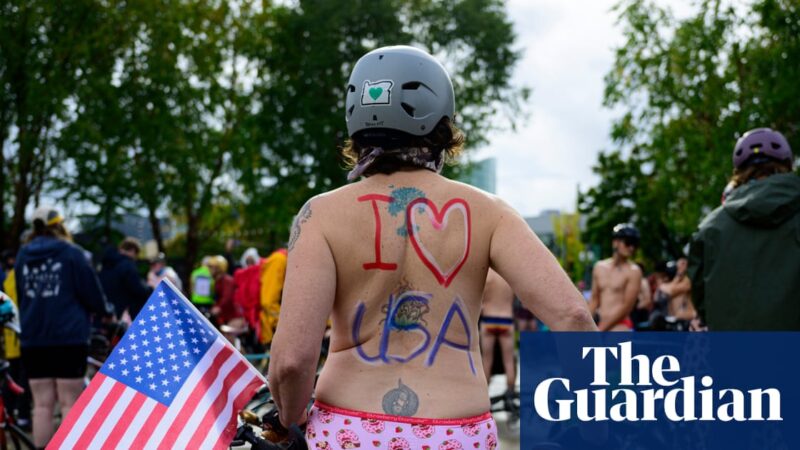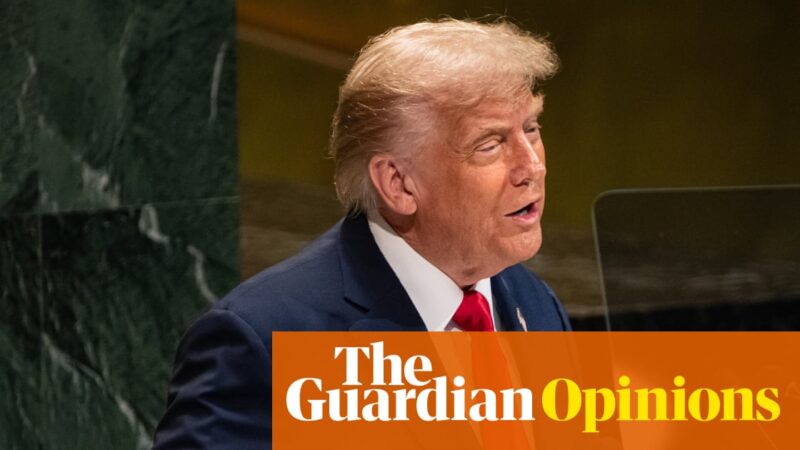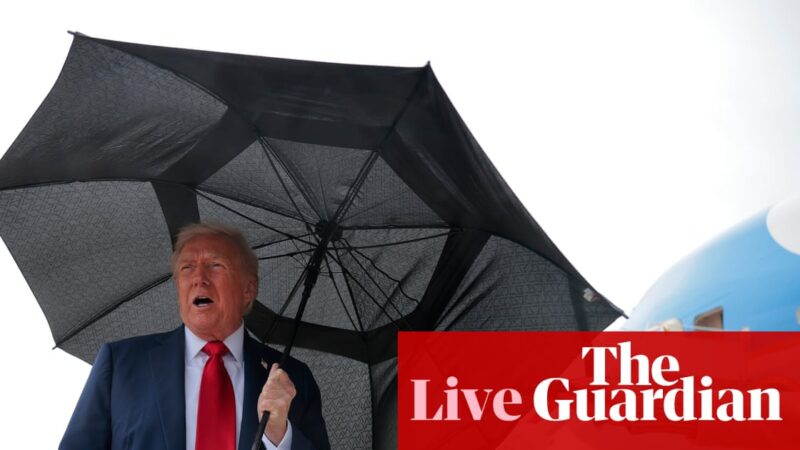Trump will soon be gone but Britain’s problems will remain. Starmer’s invitation was a big mistake | Frances Ryan
As Donald Trump met with a grinning Keir Starmer and senior royals on his UK state visit this week, I found myself needing a Daily Mail body language expert.
Did Starmer’s hand wave suggest he wanted to ask about the migrants currently being jailed surrounded by alligators in Florida? Did King Charles’s lip shape mean he was wondering about the women who’ve accused Trump of sexual assault?
Still, best not to think about it. That seemed to be the mantra of the visit. As protesters lined the street, the British delegation stuck its fingers in its ears and pulled out the stops: a gilded carriage, a military ceremony and the foreign secretary, Yvette Cooper, doing the sort of enthused head tilt that looked as if she was trying to communicate she was being held hostage.
It has felt at times as if we are all extras in an even worse version of Love Actually, in which liberal wet dream Hugh Grant does not in fact stand up to the villainous US president (but at least no one keeps banging on about the size of Martine McCutcheon’s thighs).
There is, of course, a practical reason for wooing Trump. Continuing the special relationship has been credited with protecting the UK from sky-high tariffs, while the latest visit has reportedly been timed to coincide with a £150bn investment from US firms. And yet the fact that Trump’s itinerary has steered him away from London – avoiding the larger protests being staged there – and has conveniently occurred when parliament is in recess does betray the sense that (whisper it) none of this is actually OK.
Whether it is the horror in Gaza or the rise of inhumane anti-migrant policies, it is the pretence that the timeline we are living through is normal that is truly insanity-inducing. Or to put it another way: you know there is something wrong with a diplomatic trip when it begins with a photo of the guest of honour stood next to a child sex trafficker being projected on to Windsor Castle.
Trump’s unprecedented second state visit to the UK is in essence realpolitik gaslighting, in which we are told a man who is threatening to take over the police force of the US capital should be gifted the literal red carpet treatment (and the Red Arrows).
That Trump is in the country only days after what is thought to have been the largest nationalist event in Britain in decades makes this unease all the more palpable. It is hard not to feel that a disease is being allowed to spread, as the far right bleed over Westminster Bridge and a US president who this week celebrated the removal of a late-night TV host for making a critical joke enjoys the largest-ever guard of honour at a state visit.
The pomp and ceremony bestowed to Trump is a particularly blatant example of what is, on both sides of the Atlantic, a widespread acceptance of the unacceptable. While in the US the late Christian nationalist Charlie Kirk is sanctified, here an MP calls “the vast majority” of a crowd listening to great replacement theory “good, ordinary, decent people”. (Spoiler: it was Nigel Farage.)
The crisis we are facing is only worsened by the sense our elected officials are so staggeringly unequipped to deal with the scale of the challenge (or indeed, are busy stoking it themselves). There was a remarkable period over the weekend when it was unclear whether the prime minister would even respond to the march, as if Starmer had gone to the football and just forgotten to put his phone back on. In the end, it took 24 hours for Downing Street to release a statement saying the government would not tolerate people being “intimidated on our streets because of their background or the colour of their skin”. As context, that response rate was slower than the band James’.
Five days after Elon Musk called for the dissolution of parliament, the government is still using X for official purposes. “We are a fair, tolerant and decent country. But we are in the fight of our times,” Starmer tweeted on Tuesday, notably falling short of referring to the far right. I imagine this is what it felt like to see the gunpowder plot foiled, if James I kept posting on Guy Fawkes’s social media platform.
At the time of writing, the leader of the opposition, Kemi Badenoch, has not tweeted anything about 110,000 people attending a march organised by Tommy Robinson and has not wanted to talk about it when asked by the media. She has, however, found time to promote her new LBC show.
I can’t help but think back fondly to the 2010 general election, when Gordon Brown said a voter was a “bigot” for lamenting “all these eastern European what are coming in”. I’m not suggesting Starmer starts insulting the public or presidents – at least not on mic! – but I find myself wondering: when will our leaders call a racist a racist? And what does it say about the current political culture that makes them so afraid to?
That this week it was largely left to Sadiq Khan, one of Britain’s few senior Muslim figures and a key target for Islamophobic threats, to call out Trump for fanning the “flames of divisive, far-right politics around the world” is a stark lesson in dereliction of duty versus bravery.
By Friday morning, Trump will be off British soil. But the crisis he represents will remain. Hate and division cannot be sent away with a flight on Air Force One. It takes long, hard conversations and courageous action. Whether Starmer and co are up to the task is the question. One thing’s for sure: if you are ever to solve a threat, you must first name it.





